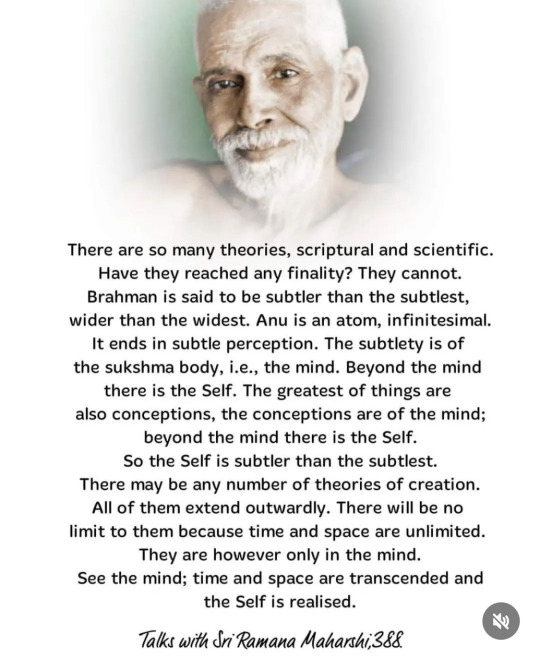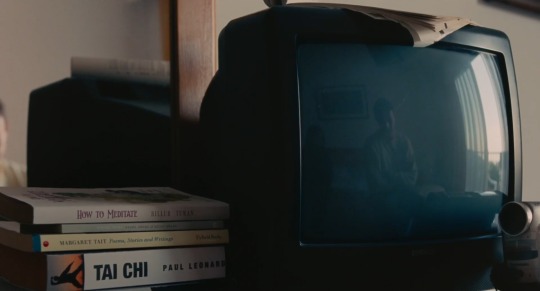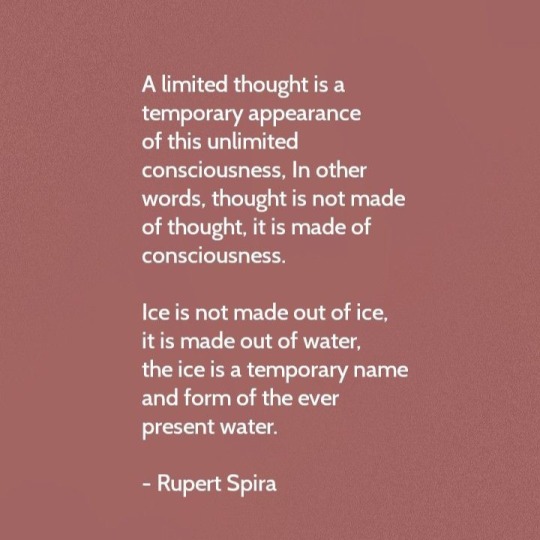#rupert spira
Text
To say 'I am God' does indeed sound arrogant. It feels like blasphemy.
But in fact, blasphemy is not to say 'I am God'. Really blasphemous is to say 'I am a person'. Because in saying 'I am a person', I'm saying that I am a being with my own independent existence. I'm saying that my Being is separate from God's Being. And if my Being is separate from God's Being, then God's Being must be limited. In other words, to say 'I am a person' is to deny the (omni) presence of God. That is blasphemy. If we are setting ourselves up as a separate, temporary, finite being, we are denying the infinite Being. That's why it's not arrogant to say 'I am God.' To say 'I am a person' - that is arrogant.
Rupert Spira
91 notes
·
View notes
Text
it is not necessary to get rid of thoughts, images or ideas; just cease deriving your sense of identity from them.
ー rupert spira
303 notes
·
View notes
Text
youtube
#advaita#nonduality#spiritual#spirituality#yoga#meditation#hinduism#freedom#self inquiry#peace#rupert spira#hinduculture#meditateonthis#meditatedaily#meditative#how to meditate#no mind#mindfulness#consiousness#becoming aware#awareness#jnana yoga#self realization#self reflection#Youtube
68 notes
·
View notes
Text
We are not present in the now – we are the now. The now is not a container that holds our self along with everything else. It is our self, eternal presence.
– Rupert Spira,
42 notes
·
View notes
Text

#ramana maharshi#hindu bhagavadgita hinduquotes hindusahebannahisamjhegitavedpuran ramananmaharshi india meditation meditationquotes yoga templeso#awareness#brahman#consciousness#nothingness#atman#sri nisargadatta maharaj#rupert spira#robert adams
23 notes
·
View notes
Text
Many of our ideas and beliefs about ourselves and the world are so deeply ingrained that we are unaware that they are beliefs and take them, without question, for the absolute truth.
Rupert Spira
67 notes
·
View notes
Text

Aftersun (2022) by Charlotte Wells
Book title
How to Meditate by Billur Turan
Being Aware of Being Aware (2017) by Rupert Spira
Poems, Stories and Writings (2012) by Margaret Tait
Tai Chi by Paul Leonard
#english literature#books in movies#aftersun#charlotte wells#how to meditate#billur turan#fictitious books#fictitious books in movies#being aware of being aware#rupert spira#paul leonard#tai chi
61 notes
·
View notes
Text
Personal and Impersonal desires
Disclaimer: The words below are from this article
Most of us will have encountered the idea that desires are a barrier to enlightenment. It occurs in Mr Ouspensky’s system, in the Shankaracharya’s teaching and in many other spiritual traditions. We are instructed to have fewer desires or to reduce all our desires to just one desire – the desire for liberation. But is this the only way? Is it really possible? How can it be achieved?
This is how Francis Lucille answered a related question:
Q: Is desire a hindrance and should certain objects be avoided?
This is not a path of detachment from objects, of depriving oneself of life. On the contrary, life should be a celebration. We need to discover what life is before we can truly celebrate it. When we find out what life really is, a natural detachment takes place. This detachment is effortless, because our discovery gives us such absolute happiness, cures us so radically of fear, gives us such an ease of being and freedom, that the usual objects of desire seem pale in comparison. In other words, we are not detaching ourselves from objects through practices or disciplines; they are detaching themselves from us as a result of understanding and causeless joy. The objects are all still available but the difference is that we no longer use them to obtain happiness. We use them to celebrate happiness.
There are no regrets on this path. We can still do whatever we previously wanted to do but we do it in freedom, because we understand everything we do as a celebration of our freedom, not as a means of fulfilment. When we have this understanding and attitude towards life, the universe cooperates with us. It becomes our accomplice. [The Perfume of Silence, ch6]
That does not mean that after enlightenment all desiring thoughts disappear. If we are thirsty, then it is natural to desire water. And isn’t listening to music, going for a walk in the countryside, enjoying a meal with friends all part of the celebration of happiness? All those activities must surely spring from an initial desire. So are some desires ‘good’ and others ‘bad’? Here is Rupert’s explanation:
There are two essential types of desire: one is initiated by the separate-inside-self thought and always seeks to acquire happiness and love through an object, situation or person; the other proceeds directly from our being, unmodulated by the sense of separation, and expresses, shares and celebrates itself in the world of form, that is, through objects, activities and relationships.
In other words, one goes towards happiness and love; the other comes from it.
Ultimately all desires are an expression of the peace, happiness and love that is our self, but if this is not clearly understood, happiness and love will always seem to be the goal of our activities and relationships rather than their source. [Presence: The Art of Peace and Happiness, p82]
So when a desire arises, how can we tell which sort of desire it is? And if it seems to be centred on a feeling of being a separate self, on one of those illusory I’s that Mr Ouspensky described, what should we do about it? Trying to get rid of desires is just like trying to get rid of thoughts or feelings – it doesn’t work. Here is Rupert’s advice:
Try to have thoughts, and therefore desires, that are in line with your deepest love and understanding. When you have a desire, as it arises, before you rush headlong to fulfil it, just pause. Ask yourself ‘on whose behalf is this desire arising?’ Does it truly come from love? From intelligence? From peace? Or does it come from a sense of lack, that is seeking, through the desire, to acquire an object – a substance, an activity, a state or a relationship – in order to give this fragment happiness. And if the desire is coming from that place, instead of seeking to fulfil the desire, through the acquisition of the object, turn around and question the fragment – the sense of lack, or dis-ease, or discomfort, from which the desire is arising. Because what you are really seeking through the acquisition of the object, is in fact lying just behind the discomfort. You have to go back through the discomfort this way [inwards towards the Self that feels the discomfort] in order to find what you are truly looking for in the object out there.
But if the desire does come from a sense of fulfilment, then feel free to act on the desire. You can pursue the desire, and if the desire is not fulfilled, you won’t mind in the least. Because it was coming from fulfilment, you were already fulfilled, so it doesn’t matter to you in the least if your desire is not fulfilled, it leaves no trace of longing or disappointment in you.
[Video clip, 14/11/2013: The Universe Fulfils Impersonal Desires]
Rupert describes those desires that come from happiness and a sense of fulfilment, as impersonal desires, and those that revolve around a separate self, as personal desires. Here is some advice he gave at the recent retreat in Wales about how to tell the difference:
One way to tell whether our desire is impersonal or not, is that if the desire is not fulfilled, we don’t mind. If the desire is coming from a sense of lack, then if it’s not fulfilled, we will feel frustrated. But if for instance, let’s say the desire for a companion, if it’s coming from a desire for love, then if we don’t get the companion, we will feel empty, we will feel frustrated, unloved and unloving. But if the desire is coming from love, from a desire to simply celebrate that love and express that love, because it is natural for love to be celebrated and expressed, then if the desire is not fulfilled immediately, then we are just left with our love. There’s no frustration there. So that’s a good way to test on whose behalf the desire or the request is rising.
[Buckland Hall retreat 26/04/2016: The True Safety of Awareness]
It is sometimes said that if you want something strongly enough, you will usually eventually get it.
This often seems to work, but we need to make sure the desire is an impersonal one:
Q: Would you say that when you would like something to happen, you better ask it clearly?
RS: Not clearly - impersonally. Because the reason why an impersonal desire is fulfilled is because the one who is asking is the same as the one who is asked. But what you desire, or ask for, has to be asked for on behalf of the whole – not on behalf of the person. Therefore, it must be an impersonal desire. So if you ask the universe to send you a companion to fill up your sense of lack, beware! You won’t enjoy your companion. But if you ask the universe to send you a companion to share and express and celebrate the impersonal love that you feel, then the universe will send you a very sweet friend. …
Just make sure that what you are asking for is on behalf of truth, love or beauty.
[Buckland Hall retreat 26/04/2016: The True Safety of Awareness]
What about the desire for enlightenment? Is that personal or impersonal? It often seems to start as a personal desire for an object or objective experience, but as Francis Lucille explains, it has a very different quality from a personal desire for a house, a car or a girlfriend:
The desire for the Absolute comes from the Absolute. Although everything is the deed of consciousness, to seek consciousness knowingly is a special kind of deed. It is not an ordinary type of activity. It comes from grace. Everything is grace, but to seek grace is a special grace.
[The Perfume of Silence, ch14]
It is that special grace that guides our search and leads us to our heart’s desire:
For a mind that has become accustomed for so many years to knowing only objects—that is, to focusing its attention and interests on the body, mind and world alone—it is inevitable that the desire to know oneself as some kind of a subtle object will persist. We will search for this aware presence and try to make it an object of our knowledge or experience.
However, if we return again and again to the experiential understanding that our self is the knower or witness of all objects, it becomes clear that it cannot itself be an object.
We may find ourselves again moving out into the so-called world but this time without motive. The inclinations of our particular body and mind are undertaken spontaneously, without calculation, and they leave no trace of a separate self. We may find our self still having desires but they are no longer motivated to find peace, happiness and love; they seek only to express, share and celebrate it.
[Rupert Spira: Presence - The Art of Peace and Happiness, p155.]
Most of us were brought up with the belief that in order to get what we want, we need to work hard and be persistent. But enlightenment doesn’t work like that. Here is an extract from a dialogue I had with Rupert on that subject:
RS: The energies of the separate self can only be directed towards objects. They can only be used
for the acquisition of some kind of a state, or an object, or a relationship. It is a dissolving of
those energies, not a redirecting of them. We cannot go towards enlightenment: we can only go
towards an object. Any direction that we take is the wrong direction.
…
JB: But the focus has been on remembering that I need to allow attention to sink back [into its
source].
RS: But the focus in this case is an activity of your mind. It’s a directing of your mind. It’s more a
relaxation of that focusing. You can’t direct the mind to its source. You can only direct the mind
to an object. It is the relaxation or the falling back of attention – not the redirecting of attention.
JB: But something initiates that.
RS: Yes. What initiates it from the separate self’s point of view? It seems to be initiated by a
desire for happiness, a desire for enlightenment. In fact the separate self doesn’t do anything, it
doesn’t desire anything. When the separate self feels the desire for happiness, what it is actually feeling is the pull of attraction from its true nature. The separate self doesn’t do anything – it is attracted by happiness, it is pulled by happiness. The separate self feels ‘I want to go there, I’m determined to get there’. No, all it’s feeling – and that’s what grace is – is the pull of awareness which is acting on the separate self.
So imagine you have a rubber band. The further you stretch the rubber band, the further one end of the band goes from the other end, the greater the force of attraction pulling it back to its original state. So the separate self is like a rubber band that goes out and out and out and out, seeking happiness in objects further and further and further away from its source. The further it goes from its source the greater the pull from its source. It experiences that pull as suffering. … The experience of suffering is happiness pulling us back to itself. The other end of the band can’t go looking for its source – it’s attracted back to its source. And when it comes back to its original condition, then all the tension is released, the suffering is released. That’s called ‘happiness’, when there is no more tension, no more suffering. It’s come back to its source, its original condition. The separate self has merged in the true self. That’s what happiness is. For the separate self can’t go there – it’s the only place the separate self can’t go.
[Gaunts House retreat 1/12/2014]
If we understand that we don’t choose our thoughts or actions – we are not the doer – it will be obvious that we don’t choose our desires either. Our desire for enlightenment just happens. If we cooperate with it – allow it to pull us back into its source – it will become impersonal, it will grow in intensity, and our deepest longing will be fulfilled:
Q. How should one lead one’s life if seeking enlightenment?
RS: According to the strength of one’s desire for enlightenment. In fact, everyone is searching for enlightenment, which is simply the search for Happiness. Most people search for Happiness in the realm of objects, that is, in the realm of the mind, body and world.
Once it has become obvious that Happiness does not reside in the realm of objects, all the energies that were previously directed outwards towards them are now gathered and turned towards their source.
At a certain point this becomes all-consuming and a great intensity arises in one’s heart.
What it is that ignites this love of truth, I do not know. It is truly a gift of Presence.
[Rupert Spira: Interview with Paula Marvelly - June 2010]
Contemplation
We never truly desire an object for its own sake; we desire only to be relieved of the agitation of resistance and seeking that takes us away from the Now into time. Thus, all we ever truly desire is to be desireless. [Rupert Spira]
20 notes
·
View notes
Text
"I alone [always] remain so 'I' is the experience of being aware or Awareness itself. "
🤯
- Rupert Spira
14 notes
·
View notes
Quote
Let thoughts and feelings have their home in you,
but don't make your home in them.
Rupert Spira
38 notes
·
View notes
Text
"The greatest discovery in life is to discover that our essential nature does not share the limits nor the destiny of the body and mind."
- Rupert Spira
4 notes
·
View notes
Text
Being is like the sun: it cannot be extinguished.
It shines brightly even in the darkest places.
The Heart of Prayer
RUPERT SPIRA
16 notes
·
View notes
Text

34 notes
·
View notes
Text
In most people attention moves perpetually from one object or experience to another, with only brief periods of respite in the interval between two thoughts or perceptions, in moments of peace or happiness, and during deep sleep, when the mind is at rest in its source. But when, through interest in its own essential nature, the mind ceases to direct itself towards objective experience, it begins to sink or relax back into the source from which it has arisen. This source is pure knowing or awareness, before it knows or becomes mixed with any objective knowledge.
This falling back of the attention into its source is the means by which the mind comes to know its original nature. In fact, this is not an activity of the mind, although it may seem as such to begin with, but rather the cessation of a previous activity – the activity of overlooking the knowing of its own objectless, self-aware being in favour of objective knowledge and experience.
Rupert Spira
27 notes
·
View notes
Text
The greatest discovery in life is to discover that our essential nature does not share the limits nor the destiny of the body and mind.
Rupert Spira
8 notes
·
View notes
Text
🧘🏻🕉️📿
youtube
18 notes
·
View notes